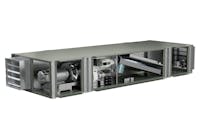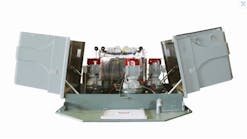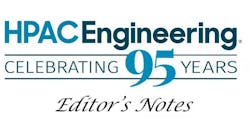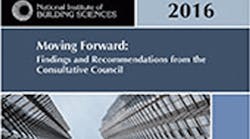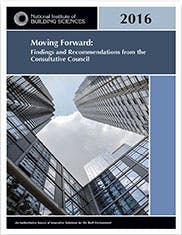The availability of skilled workers and potable water are significant challenges facing the U.S. building industry, the National Institute of Building Sciences Consultative Council says in its 2016 “Moving Forward” report, released Jan. 9 during the council’s Annual Meeting, held as part of Building Innovation 2017: The National Institute of Building Sciences Annual Conference and Expo.
“As identified in the 2014 and 2015 reports, the availability of a skilled building-related workforce now and into the future remains a significant challenge to the U.S. building industry,” the National Institute of Building Sciences says. “While the issue of water also has been covered in prior reports, a recent increase in droughts and infrastructure issues in places such as Flint, Mich., have underscored the importance of potable water and the efficient and healthy use of this limited resource. While many of the other challenges identified in earlier reports remain, and those associated findings and recommendations still are relevant, the two issues of workforce and water continue to weigh heavily on the building industry and are the primary focus of the 2016 ‘Moving Forward’ report.”
Developing a Skilled Workforce
Over the last several years, nearly all sectors of the U.S. building industry have reported a growing shortage of skilled construction workers. In the 2016 report, the Consultative Council identifies several causes of this trend and offers recommendations to address them, including:
- Promoting technical and trade programs in K-12 and technical schools, emphasizing good career opportunities.
- Encouraging women and veterans to enter the construction sector.
- Establishing programs employing building-industry professionals in underserved communities in exchange for a reduction in their student debt.
- Developing state and/or national reciprocity programs for certified trade professionals, allowing the professionals geographic mobility to follow career opportunities.
- Allowing low-interest federal loans to be used for industry credentials/certifications and post-secondary education.
Water Resources and the Built Environment
In the report, the Consultative Council offers recommendations for developing a holistic water strategy for the United States, including:
- Expanding and adequately funding federal water programs to help utilities improve infrastructure while also meeting federally mandated water-quality requirements.
- Allowing federal and state government funds to be used for projects relating to water reuse.
- Developing best practices for utilities to reference when changing their water-treatment processes.
- Modernizing existing water-pipe-sizing calculations developed during the 1930s and 1940s.
- Incentivizing the removal of water-guzzling plumbing fixtures and the installation of new, high-efficiency models.
- Requiring utilities to provide and install smart water meters.
- Requiring compliance with standards to mitigate outbreaks of legionellosis and other waterborne diseases in building water systems.
- Issuing uniform water-treatment and water-quality requirements for the use of non-potable water.
The Consultative Council brings together U.S. building-industry organizations to identify policies, practices, and trends hindering the achievement of national goals concerning high-performance buildings and communities. Each year, the council develops a “Moving Forward” report to examine some of the challenges and offer findings and recommendations concerning how to overcome them. The summarized report becomes part of the National Institute of Building Sciences’ Annual Report, which goes to the president of the United States and the U.S. Congress.
To download the 2016 report, “Moving Forward: Findings and Recommendations From the Consultative Council,” click here.

